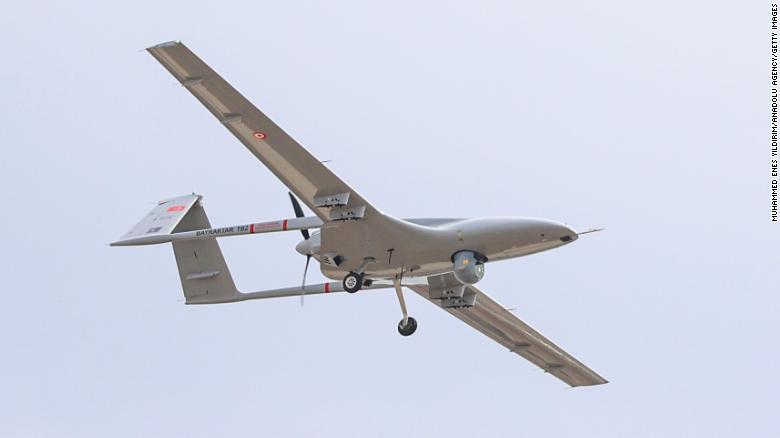Turkish drones have become a symbol of the Ukrainian resistance

The “Bayraktar” has become so popular that Ukrainians are now naming their pets after the Turkish-made drone. Last month, the mayor of Kyiv announced that a newborn lemur at the city’s zoo would be named Bayraktar and the foreign ministry tweeted a photo of another Bayraktar, a puppy at the Kyiv police dog training center. Western and Ukrainian officials have praised Turkey’s Bayraktar TB2 drones for playing a part in countering Russian attacks. Last month the British defense secretary Ben Wallace Ukraine was the first country to purchase the TB2s in 2019 and has ordered at least 36 drones so far. Last month, its defense minister announced the arrival of a new shipment of the drones. Selcuk Bayraktar, the chief technology officer of Baykar Technologies, is more keen to talk about his drones’ technology than politics. He also happens to be the son-in-law of the Turkish president, who has emerged as a key mediator between Russia and Ukraine in the war. Bayraktar has heard the song dedicated to his namesake drone and knows the social media phenomenon it has become in Ukraine, but he measures his words carefully when discussing Ukraine. “I think it is one of the symbols of resistance, it gives them hope,” Bayraktar, an engineer and graduate of the Massachusetts Institute of Technology, told CNN during a rare tour of the drone production facility in Istanbul last week. “People are resisting and defending their homeland from an illegal occupation and … if you want independence you have to be able to stand up and resist and I think that’s what the brave people of Ukraine and leadership has done,” he said. “At the same time, you need technology, you need your own indigenous defense capacity, but when people’s lives are on the line… I don’t want to compare that to any sort of technology.” On display is the “Kizilelma” (Red Apple), Turkey’s first unmanned fighter jet, which has just hit the production line and is named after the Turkish mythologic expression that symbolizes the ideal — the goal one wants to reach. Bayraktar said it is expected to begin flying next year. Industry experts say factors such as cost are what make the drones appealing. “[The] Bayraktar TB2 offers an almost perfect price and combat efficiency balance [and] has an affordable unit cost,” said Dr. Can Kasapoglu, Director of Defense Research of Turkish Center for Economics and Foreign Policy (EDAM). “TB-2’s competitors in the weapons market are more expensive, come with more bureaucratic and political hurdles for procurement, or come with uncertain supply sustainability.” The company didn’t release price information. The drone is also combat-tested which is a crucial criterion in arms transactions, he said. “When the music stops, TB2s are likely to inflict more damage on the adversary than they take,” Kasapoglu added. “This is of critical importance, especially for NATO’s eastern flank”. Baykar Tech has signed contracts with at least 19 countries, most of which were signed in the past 18 months. Among the buyers is Poland, the only EU and NATO member to have ordered the UAVs. Turkey’s defense and aerospace industry registered more than $3 billion in exports last year, a record, according to the country’s state-run news agency. “It is important to strengthen defense and aviation exports to countries with whom Turkey has strategic relations,” Haluk Bayraktar, Baykar’s CEO and younger brother of Selcuk, told the Anadolu news agency in January. “Beyond providing an economic gain, defense exports also provide a suitable basis for establishing strategic relations with the countries to which you export,.” For Selcuk Bayraktar, this is not only a family business and a lifelong passion for engineering. He said this is about ensuring his nation’s independence and technological self-sufficiency. “When I was in my 20s … you could say we are going to be the best in soccer… [or] in baklava, in kebab, but no one could say we are going to develop a niche technology that is going to be worldwide famous.” Celine Alkhaldi and Eyad Kourdi contributed to this reportOther top Middle East news Iranian MPs set conditions for reviving nuclear deal as authorities sanction 24 more Americans Iranian lawmakers demanded a number of conditions for reviving the 2015 nuclear pact with world powers, including legal guarantees approved by the US Congress that Washington would not withdraw from the deal, reported Iranian media on Sunday. Separately, Tehran on Saturday imposed sanctions on 24 Americans. Background: Negotiations to revive a 2015 nuclear pact have been stalled as both Iran and the US blame one another for failing to resolve outstanding issues. Iran has also demanded that its elite Islamic Revolutionary Guards Corps be removed from the US list of foreign terrorists. Why it matters: As talks stall, increased sanctions by Iran and further demands could endanger the chance of reaching a final agreement. Iran’s sanctioning of 24 more Americans, including former Army Chief of Staff George Casey and former President Donald Trump’s attorney Rudy Giuliani, might further restrict talks in the negotiating room. Saudi Arabia to allow up to 1 million Hajj pilgrims as Covid-19 rules ease Saudi Arabia will allow up to 1 million Hajj pilgrims this year, expanding the holy event to visitors from outside the kingdom after two years of strict Covid-19 restrictions, state media said Saturday. Background: Visitors this year must be under 65 years old and fully vaccinated. Visitors from abroad must present a recent negative PCR test. Last year, pilgrim numbers were limited to 60,000 domestic participants. Why it matters: One of Islam’s five main pillars, Hajj in Saudi Arabia before the pandemic saw up to 2.5 million visitors, and previously earned the Kingdom about $12 billion a year. Two Palestinian women killed in separate incidents as tensions remain high Two Palestinian women were killed by Israeli forces in separate incidents on Sunday as tensions and violence between Israelis and Palestinians continue after weeks of attacks. Background: A 47-year-old widow and mother of six was shot on Sunday “while she was crossing an Israeli military check point near the village of Husan” in the West Bank, according to the Palestinian Ministry of Health. The Israel Defense Forces said the woman “approached IDF soldiers” and did not stop when she was told to, and was consequently shot. Later on Sunday, another Palestinian woman who stabbed a border police officer by the Tomb of the Patriarchs in Hebron was shot and killed, according to a spokesperson for the Israeli border police. Why it matters: Tensions have remained high as Israeli soldiers continue operations in the West Bank connected to recent attacks in Israel that killed 14 people in less than a month. Around the region




